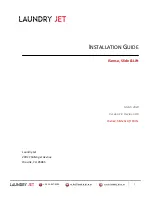
• The glass jars are to be
2/3
to
3/4
submerged; if you use
the upper level as well, this applies to the upper level.
• When placing the glass jars in the cooker, water
temperature should be approximately that of the jars as
this saves time and energy.
• Place lid on the appliance.
• Please refer to the following index or to common
cookbooks for cooking temperature and time.
• The time needed to heat up is not included in the cooking
time; it only begins after the selected temperature has
been reached.
• On a setting below the boiling point the pilot lamp will
go off. Strong steam development indicates boiling.
• After the cooking time is over, take out the glass jars.
Braces and other lid fasteners should be left on the jars
until these have cooled completely. Cans should be put
into cold water immediately.
• It is advisable to mark the glass jars, cans etc. with date
and content. The best way to keep preserved food is in a
dry, cool and dark place.
The model equipped with outlet tap
is to be operated the
same way. Yet there is an additional possibility to pour out
liquids through the outlet tap. To prevent blocking during
preparation of thick liquids we recommend to plug up the tap
from the inside, e.g. with a bung. From time to time the tap
should be cleaned with hot water which can be mixed with
some detergent.
Brief Operation Outline
Preserving
• Place grating insert
• Put in prepared glass jars or bottles
• Fill in water
• Place lid
• Plug in appliance
• Set temperature
• Pilot lamp is on (heating process)
• Pilot lamp goes out for the first time: this indicates that
the selected temperature has been reached, now actual
cooking time begins. Temperature is maintained
automatically.
• Set the temperature selector to
0
and pull the mains plug
upon completion.
Juice making
• Fill in at least 6 litres of water
• Place fitting ring and Juice Extraction Top on the appliance
as shown in the drawing
• Place fruit in the fruit basket
• Place lid
• Plug in appliance
• Set temperature selector on ‚Entsaften‘
(juice-making position)
• Pilot lamp is on (heating process)
• Add water before each juice extraction operation
• Set temperature selector to
0
and pull the mains plug
when operation is finished.
Interesting Points About Preserving
First of all: grandma’s good old rules for preserving have
not been changed! Preserving means sterilizing food without
any chemical preserving agents. The even heat that is gene-
rated kills the germs in the items to be preserved; at the
same time the resulting vacuum seals the jar hermetically
and germfree.
Only... the preserving cooker has come a long way since
grandma’s time! Auto-Preserving Cookers make it a lot
easier, and grandma would have been glad to have one!
But Now To Preserving Itself
Cleanliness and thorough preparing dictates keeping the
preserves. Fruit and vegetables should be of good quality,
fresh and ripe.
• Wash fruit and vegetables thoroughly and let dry.
• Green beans and peas keep longer if you blanch them
briefly first.
• Glass jars, cans, bottles and their lids should be washed
carefully in hot, soapy water, then rinse with clear water
and place them on a clean cloth till water has run off.
• Check containers for stubborn residues and damaged
pieces.
• Leave seals in clear water till they will be used.
• Do not use any porous, damaged or over-stretched rubber
rings or caps.
• Fill the containers up to
2
cm below the rim; when
preserving pulpy items (apple purée etc.) leave
3
to
4
cm
under the rim. The new glass jars for preserving can be
filled higher; please take the instructions when buying
glass jars into account.
• When making sausage fill containers only
3/4
.
• Close containers tightly with screw-on lids or clamps.
• Close bottles immediately upon completing sterilization
process.
• Always place glass jars on insert grid. Different size glass
jars may be used.
























